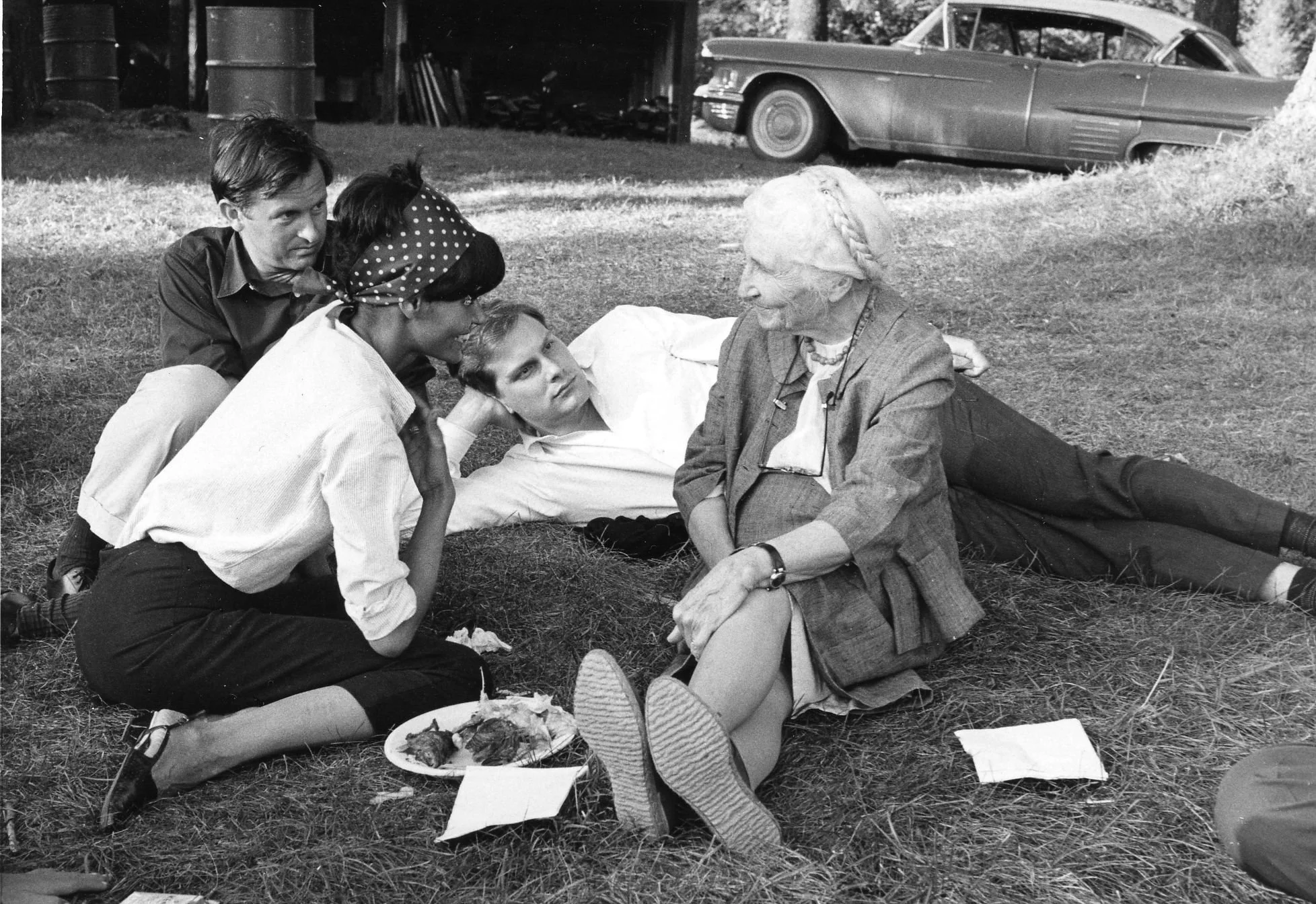Frances Hubbard Flaherty
Grace An
Wife of legendary documentary filmmaker Robert Flaherty, Frances Hubbard Flaherty (1885-1972) was the driving force behind the founding and longevity of the Robert Flaherty Film Seminars.
After collaborating on every single classic film made by her husband until his death in 1951, she devoted the rest of her life to the articulation and explanation of Robert Flaherty's view on documentary film, both in her writings (including her book, The Odyssey of a Filmmaker: Robert Flaherty's Story, 1960), and especially her establishment of the Seminars. She envisioned them as a collaborative forum for remembering and embracing her husband's legacy of filmmaking, which she termed "the Flaherty Way."
The Flaherty Daughters in Moana
Participants of Seminars past remember her rigor, passion, hospitality, and drive. They also recall how her inclusion of classical and folk music in the early Seminars was driven by the idea of cross-fertilizing creativity through all the arts. An avid reader and indefatigable collector of quotes and ideas, Frances Flaherty attended Bryn Mawr College, where she developed a passion for Eastern philosophy, theology, mysticism, history, aesthetics, communication, psychology, and other disciplines.
Along with her interests in filmmaking and music, Frances Flaherty brought her intellectualism to bear on the Seminars and film culture in general, subsequently earning a place of her own in film history. The Robert Flaherty Film Seminars, which she founded, have functioned as a fertile think tank and incubation center for all forms of independent cinema outside the studio or commercial arenas.
From The Odyssey of a Filmmaker: Robert Flaherty's Story (1960), by Frances Flaherty:
"Robert Flaherty's whole life was a passionate and stubborn fight for the exploratory way " for a natural poetry, for a greater awareness of the essential truth of things as they are, a deeper communion with all being."
"Non-preconception is the pre-condition to discovery because it is a state of mind. When you do not preconceive, then you go about finding out. There is nothing else you can do. You begin to explore. ‘All art,' said Robert Flaherty, ‘is a kind of exploring. To discover and reveal is the way every artist sets about his business.' The explorers, the discoverers, are the transformers of the world. […] Above all, they are the artists, the poet, and the seer, who out of the crucible of new fact and new idea bring new life, new power, new motive, and a deep refreshment. They discover for us the new image."
"If you preconceive you are lost, off to a false start before you begin. What you have to do is to let go, let go every thought of your own, wipe your mind clean, fresh, innocent, newborn, sensitive as unexposed film to take up the impressions around you, and let what will come in. This is the pregnant void, the fertile state of no-mind. This is non-preconception, the beginning of discovery." [20]"The Flaherty films are timeless in the sense that they do not argue, they celebrate. And what they celebrate, freely and spontaneously, simply and purely, is the thing itself for its own sake."
"From the [Inuit], Robert learned to see as he had not seen before. He had himself the keen eyes of an explorer, trained to read the signs in a landscape, but the Eskimo has eyes keener still, for on that great white screen which is his world the Eskimo must be instantly aware of every movement, every least shadow of movement that might mean game, food, life. […] The passing moment becomes the fullness of life and its fulfillment" becomes, as on the motion-picture screen, the moment of truth. The teaching of the North was its immensity, its vast simplicity, its emptiness, unclutteredness, its clarity and purity, and its elemental strength, wind and snow endlessly carving new worlds of hazard and beauty-of a mysterious, mystical beauty."
Robert Flaherty shot "for one reason only: to give the camera a chance to find that ‘moment of truth,' that flash of perception, that penetration into the heart of the matter, which he knew the camera, left to itself, could find. The point in this process was that it was purely visual. Words played no part in it; it went beyond words. It was simply a degree of seeing. As ice turns to water and water to steam, and a degree of temperature becomes a transformation, so a degree of seeing may become a transformation."
Grace An recently finished her Ph.D. in the department of Romance Studies at Cornell University. She taught in the Department of Cinema and Photography at Ithaca College, and in fall 2004 joined Oberlin College as Assistant Professor of French. She was associate producer and writer for Arctic Requiem.




